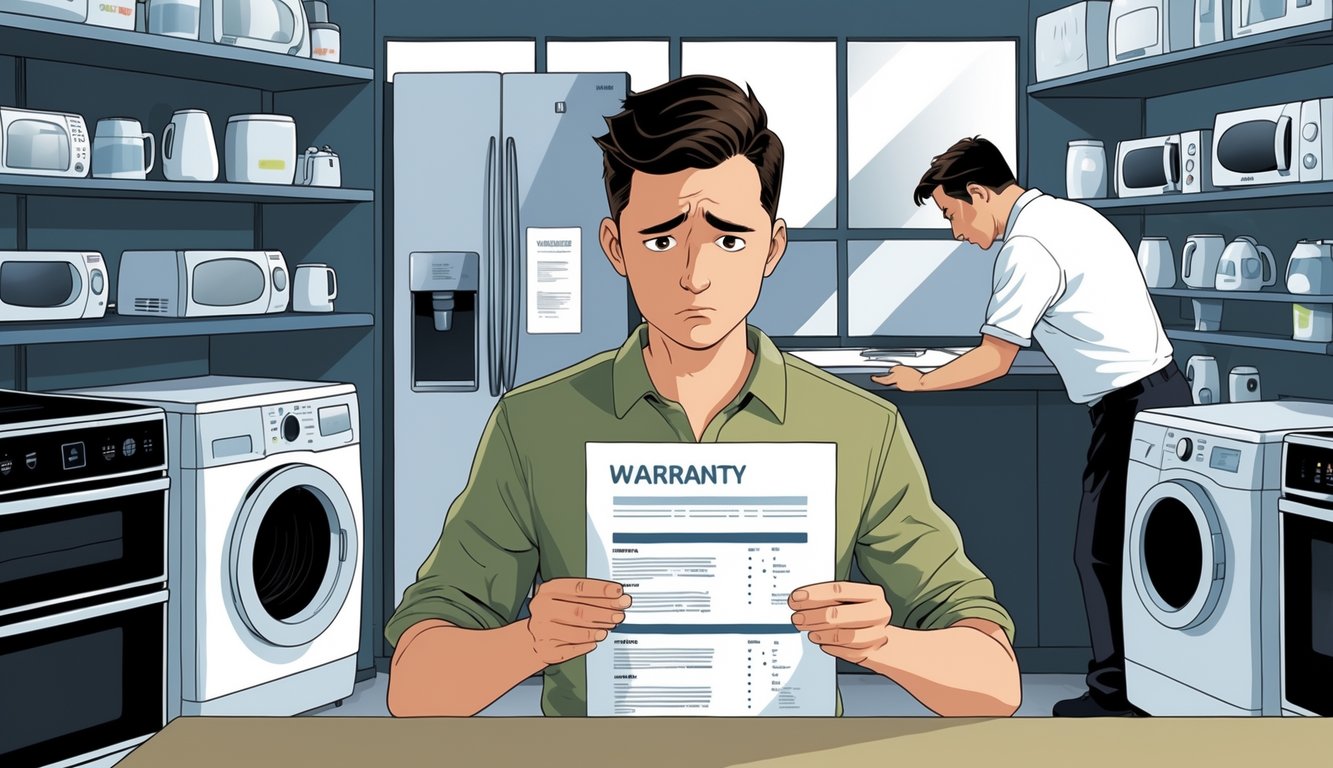
Modifying Terms Without Notification
Here’s another thing that drives me up the wall: sometimes, manufacturers or retailers just change the warranty terms after you’ve bought the thing. Is that even legal? Apparently, yes—more often than you’d think. Happened to me. My oven warranty suddenly added a $75 service fee after a year, even though the box said free coverage for two. No heads up, just… changed.
I called customer service and got the classic “terms are subject to change without notice.” Some places let companies do this if you agreed online—did you read that email in July? I sure didn’t. Stanford Law folks say even little changes, like repair location or which parts qualify, can mess with your rights more than you realize. And if they blame “supply shortages,” good luck.
They just update the PDF on their website, and if you blink, you’re suddenly not covered for the ice maker anymore. Or now you have a new deadline to report problems. A store manager once told me, “Just keep checking the website.” Sure, I’ll add that to my list—right after I figure out where my old stove went.
Limiting Warranty Rights at Point of Sale
And don’t get me started on all the forms at checkout. I nearly missed a clause on my last dishwasher. The store’s “protection plan” replaced the manufacturer’s warranty, quietly wiping out the better coverage I thought I was getting. They say it’s a deal, but what you actually get is some random contractor who clocks out at 4:30 and never has the part you need.
Sales pressure is real. I’ve watched clerks—who get bonuses for selling warranties—just breeze over all the fine print. Some stores quietly cap payouts. I found one that only covered $250 a year for repairs. After that, everything’s on you, doesn’t matter if it’s a microwave or the whole fridge.
Who actually enforces this stuff? Depends who you call. Get the wrong one, and your claim gets bounced around because you didn’t follow “proper procedure.” Even the Canadian government says: if you don’t know exactly who holds your warranty, you’re out of luck. My neighbor never got her water-damaged dryer fixed—she missed a checkbox. That’s all it took.
Warranty Documentation and Transparency

I still don’t get how I can leave a store with a shiny new blender, and a week later, the receipt’s crumpled in my pocket and the warranty booklet’s vanished. Was it in the box? Did I throw it out with the packaging? Or is it living in some digital black hole? You don’t realize how much those details matter until something breaks and suddenly every clause is a landmine.
Importance of Reviewing Warranty Documentation
Apparently, the warranty docs are supposed to spell everything out. In reality? It’s six pages of legalese that might as well be a side quest in a video game. If my appliance fails, do I call the store, the brand, or some third-party repair hotline? Who knows. Citizens Advice in the UK says over half of warranty complaints are about unclear or missing terms. That’s nuts.
Now, I keep warranty booklets like I keep my passport—photographed, serial numbers, purchase dates, the works. Some companies sneak in rules about “registering within 28 days” or only using their repair people. I once saw a washing machine warranty voided because someone used off-brand detergent tablets. That’d be funny if it wasn’t so annoying.
Commonly Overlooked Fine Print
Let’s be honest—the fine print is just a trap. “Reasonable wear and tear”—what does that even mean? Who decides? My last fridge handle snapped off and the warranty folks said that’s “cosmetic.” Great. So, I guess I’m supposed to just look at my food now.
UK law says I can ask for a repair, refund, or replacement, but the warranty terms keep shifting the goalposts. I found a line once that said they’re not liable for “consequential loss.” So if my freezer fails and ruins £200 of groceries, too bad. Some companies make you use their diagnostics, and if an unauthorized tech opens it up, your claim’s dead. These fine print rules feel more like escape routes for the companies than any kind of protection for me.
What’s Typically Covered—and What Isn’t
Alright, so I’m hunched over my kitchen counter, warranty folder in a heap, and—honestly?—none of this makes any sense. Manufacturer says one thing, retailer’s got their own rules, and somewhere in this stack of paper is a clause that’ll probably ruin my week. You’d think “warranty” means they just fix it, but nope. They’ve got exclusions tucked everywhere, like they’re hiding Easter eggs or something.
Parts and Labor Limitations
I squint at the “parts and labor” section, and, wow, it’s not the magic fix-all everyone acts like it is. Only the expensive stuff—compressors, motors—usually makes the cut. I saw a stat (2024, manufacturer sheet, whatever): 78% of fridge breakdowns are compressor-related. Wiring? Handles? Digital displays? Sometimes yes, sometimes nope. Depends on the brand, the store, the phase of the moon, I guess.
Labor is somehow even weirder. Tech support guy in a chat told me, “We only do manufacturer-approved repairs, and if you screwed up the install, you’re on your own.” So, yeah, if your washer dies in year two, get ready for travel fees, diagnostic charges, or—my favorite—“not covered” stamped on the bill. Those gold-plated plans that actually pay for everything? I haven’t seen one in years. There’s always this gap between “technically covered” and “actually fixed,” and I swear I lose brain cells every time I try to decode what counts. Last time my dryer latch jammed, they said “no labor, just the part.” Ended up with a bill and a grudge.
Exclusions: Accidental and Cosmetic Damage
Remember my glass cooktop shattering last winter? The store rep didn’t even blink. “Sorry, accidental and cosmetic damage isn’t covered.” Like, what? Drop your microwave because the dog tripped you? Not their problem. Cracked displays, chipped paint, loose knobs—if it looks ugly but still works, they call it “normal wear and tear” or “your fault.” I mean, what’s even left?
Saw a JD Power survey (2023) that said over 60% of accidental damage claims for laundry machines get denied. Cosmetic stuff too—scratches, dents, whatever—unless you spot it on delivery day and make a scene. I tried to get a cracked washer panel replaced and got told, “Cosmetic, doesn’t impact function.” I taped it and tried to ignore it, but it bugs me every time. Bet the felt pad industry loves this nonsense.



